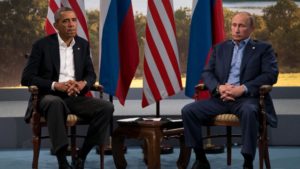Looking Past 2016: Eastern Europe & Central Asia in U.S. Foreign Policy
US-Russia relations will be critical past 2016. Source: AP
Introduction
Relative to past election cycles, the Eastern Europe and Central Asian region has featured prominently in the US election. From Russia and Ukraine to refugee issues, both the Republican and Democratic campaigns have announced their proposals toward the region. Donald Trump and Hillary Clinton use each other’s outlook on US-Russia relations to accentuate their foreign policy visions. In this iteration of The Caravel’s US foreign policy series, take a look at both candidates’ ideas with regard to the Russo-Ukrainian conflict, Russian posturing in Eastern Europe and the refugee crisis that has struck southern and central Europe.
Ukrainian & Russian aggression in Eastern Europe
As separatist conflicts continue in Eastern Ukraine, having caused over 31,000 casualties between April 2014 and July 2016, Ukraine remains a crucial geopolitical hotspot in Europe. Many European nations still look to NATO, and by extension the United States, which supplies the majority of NATO’s troops, to protect its borders in case of a Russian escalation.
Disregarding his party’s previous stance on Russian aggression in the region, Trump’s campaign amended the GOP platform in July to eliminate the provision of “lethal defensive weapons” to Ukraine. Since 2015, Trump has referred to Ukraine as a “European problem,” explicitly stating that it is the responsibility of nations like Germany to protect its territorial integrity. Trump’s dismissive position falls in line with his praise for Russian President Vladimir Putin and his contradictory remarks about NATO. America’s refusal to maintain or increase its financial and military support of the Ukrainian government may result in greater instability and further escalation of tensions in the Donbass region.
Clinton, on the other hand, has been openly supportive of Ukrainian President Poroshenko’s efforts to curb separatist activity and restore Ukraine’s territory. On September 19, Clinton met with Poroshenko in New York and “stressed her commitment to stand with the government and people of Ukraine in the face of Russian aggression.” The two leaders discussed the implementation of the Minsk agreements, which framed a roadmap to peace in Ukraine; increased American investment in Ukraine; and other possible forms of U.S. assistance. While Clinton’s notoriously critical stance toward Russia may lead to a more permanent cessation of hostilities in Donbass, it may also further damage the already lukewarm U.S.-Russian relations.
Cyberattacks & intervention in U.S. politics
During the second presidential debate, Trump dismissed the suggestion that government-sponsored Russian hackers were behind the cyberattack on DNC headquarters that resulted in the leaking of sensitive documents.
“Maybe there is no hacking. But they always blame Russia,” Trump stated, implying that Clinton invented the claims to tarnish his campaign.
However, his running mate Mike Pence conceded that evidence, including an official U.S. government statement accusing Russia of interfering with the election, does point to Russian involvement. Given Trump’s record of openly praising Putin, he is likely reluctant to openly attack the nation he has promised to ally with.
Clinton has strongly criticized Trump’s campaign for failing to acknowledge Russia’s culpability in the DNC hack. Her campaign, however, has neglected to comment on the latest series of documents released by WikiLeaks exposing Clinton’s inconsistent positions on a variety of issues and continued to focus its energy on condemning Russian hackers. Clinton campaign supporters such as former CIA Acting Director Mike Morell insist that Putin actively seeks to interfere in the U.S. election in order to help Trump win.
Although the validity of these claims may become largely irrelevant after the election, both candidates’ stances on cybersecurity will have long-term policy implications, particularly as the CIA potentially prepares to retaliate against Russia with a hack of its own, according to an NBC report.
Refugees in Central and Eastern Europe
The refugee crisis has overwhelmed Europe, and triggered changes in attitudes toward immigration over the last year. The crisis has pitted EU members against one another and whipped up support for xenophobic politicians across the continent. Reflecting the issue’s importance, both Donald Trump and Hillary Clinton have weighed in on the crisis. Whereas Donald Trump has warned that the EU will be “unrecognizable” if its members continue to take in refugees from the Middle East and North Africa, Hillary Clinton has wagered that countries must work multilaterally to accommodate refugee flows. She has also said that her administration would increase the amount of Syrian refugees offered asylum in the United States.
Clearly, the candidates hold diametrically opposed views, and this could mean several things for American foreign policy in the region. Notably, looking at Eastern and Central Europe’s conservative governments, such as those in Hungary and Poland, a Trump administration could be expected to align with their brash rhetoric and vocal demands to curb refugee settlement. These two governments have fallen under harsh criticism from other Western states, but a Trump presidency could reverse that.
Secretary Clinton, on the other hand, can be expected to continue supporting European efforts to find a global refugee settlement. Though the EU and its neighboring states have largely been responsible for handling the refugee influx, American support for these processes could encourage parties to reach agreements to stabilize the situation. Hillary Clinton’s plan to expand refugee intake in the United States can signal that the American government is more willing to be a partner and accept more responsibility for refugees flowing out of war-torn countries.
This article is part of a special Caravel series about how foreign policy proposals by the US presidential nominees will affect the regions that make up our sections. Foreign policy implications for other sections are available below:

